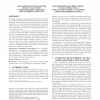619 search results - page 66 / 124 » Formal Methods Meet Domain Specific Languages |
AIMS
2007
Springer
14 years 1 months ago
2007
Springer
Policy conflict analysis processes based solely on the examination of policy language constructs can not readily discern the semantics associated with the managed system for which ...
KDD
2004
ACM
14 years 8 months ago
2004
ACM
We consider the problem of improving named entity recognition (NER) systems by using external dictionaries--more specifically, the problem of extending state-of-the-art NER system...
SAS
1994
Springer
13 years 11 months ago
1994
Springer
Strictness analysis has been a living field of investigation since Mycroft's original work in 1980, and is getting increasingly significant with the still wider use of lazy fu...
KBSE
2007
IEEE
14 years 2 months ago
2007
IEEE
Flexibility and interoperability make web services well suited for designing highly-customizable reactive service-based applications, that is interactive applications that can be ...
JUCS
2008
13 years 7 months ago
2008
: Reasoning about incomplete qualitative temporal information is an essential topic in many artificial intelligence and natural language processing applications. In the domain of n...

